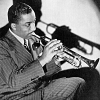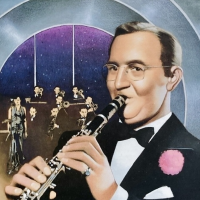Home » Jazz Musicians » Buddy Johnson
Buddy Johnson
The Buddy Johnson Orchestra was one of the most popular R&B based bands during the immediate post war years. Buddy was typical of many bandleaders of the time who often put entertainment ahead of art. By taking that route he enjoyed more hits than most of his contemporaries.
Woodrow Wilson Johnson was born in Darlington, South Carolina, on January of 1915. He took to music at an early age, becoming adept at the piano beginning at the age of five. As a teenager he was active in church and school groups arranging and producing musical presentations in the local community. By the time he was in his early twenties he headed for New York where he soon found work as a pianist with a traveling show called The Cotton Club Revue.
He soon put together a small band that played blues tunes and riff based jump and boogie dance numbers. In late 1939 he secured a recording contract with the oldest of the major labels, Decca Records. His very first recording was "Jammin' In Georgia" and "Stop Pretending" featuring Buddy on vocal accompanied by The Mack Sisters. A short time after Buddy began recording for Decca, his teenage sister Ella joined him in New York and recorded with the band, on the tune "Please Mr. Johnson." Besides Ella Johnson, singer Etta Jones also was a vocalist with the band in 1943 and 1944. Johnson showed off his talent as a composer with two of his original tunes "Troyon Swing" and "Southern Exposure." By the year 1941, Buddy had put together a tight nine piece band.
The band began to have successes for Decca during the war years, with Ella and then new addition Arthur Prysock on vocals. In late 1944 "They All Say I'm The Biggest Fool" with Prysock on vocal was a big seller for the band and it came on the heels of two other big hits "Fine Brown Frame" and "Walk em.” Ella Johnson hit paydirt in 1945with a wonderful vocal turn on a Buddy Johnson original tune that would become an American standard, "Since I Fell For You."
With a string of hit records, two superb vocalists, great original music charts, the Buddy Johnson band was one of the great attractions of the time. They were as popular at the Savoy Ballroom in New York as the Savoy in Los Angeles. They drew sellout crowds in Houston as well as Atlanta - Chicago as well as Kansas City. They were truly America's band, although the majority of America didn't know it.
Read moreTags
Buddy & Ella Johnson: Walk 'Em

Source:
JazzWax by Marc Myers
Back in the early 1950s, R&B was still largely unknown by white radio listeners and record buyers. Marketed to adults in Black urban neighborhoods on jukeboxes in corner bars and clubs, R&B's dance beat picked up where swing left off and modern jazz began. Swing dancing faded after World War II as marriage rates climbed. Many swing bands also cut back on touring in the late '40s due to fewer clubs thanks to higher taxes on venues that allowed dancing. ...
read more




























